Welcome back to This Week in Apps, the weekly TechCrunch series that recaps the latest in mobile OS news, mobile applications and the overall app economy.
The app industry is as hot as ever, with a record 218 billion downloads and $143 billion in global consumer spend in 2020.
Consumers last year also spent 3.5 trillion minutes using apps on Android devices alone. And in the U.S., app usage surged ahead of the time spent watching live TV. Currently, the average American watches 3.7 hours of live TV per day, but now spends four hours per day on their mobile devices.
Apps aren’t just a way to pass idle hours — they’re also a big business. In 2019, mobile-first companies had a combined $544 billion valuation, 6.5x higher than those without a mobile focus. In 2020, investors poured $73 billion in capital into mobile companies — a figure that’s up 27% year-over-year.
This week, the news is heavily Apple-centric. The company is hosting an event next week, where we may get some new devices and form factors, as well as AirTags (maybe!). Plus, Apple’s App Tracking Transparency is still top of mind for many developers. So this week, we’re looking at some initial ATT data that has some surprises, among other things.
This Week in Apps will soon be a newsletter! Sign up here: techcrunch.com/newsletters
Apple’s Spring Loaded event arrives next week
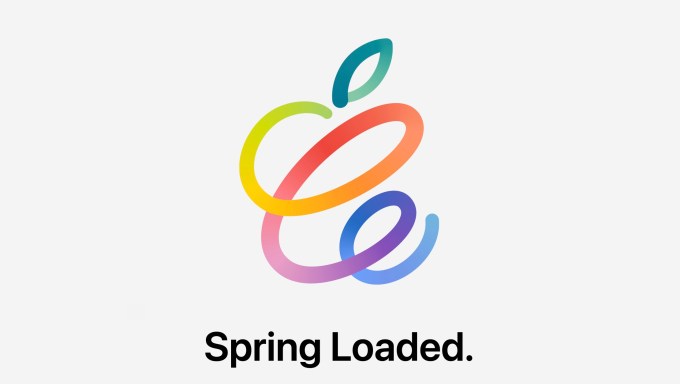
Image Credits: Apple
Apple this week announced its plans to host a “Spring Loaded” event on April 20th, where it’s expected to make a handful of updates. While nothing is for certain — this is Apple, after all — rumors are pointing toward an updated iPad Pro lineup, perhaps with Apple’s Mini LED displays. A new iPad Mini could also be on the way, as it’s not been refreshed for two years.
Bloomberg had earlier reported new iPads were coming this spring, with a refreshed iPad Pro line sporting a faster processor and better cameras, in 11 and 12.9-inch sizes, as well as an iPad mini will a larger screen size.
But there are also hints that we might finally see Apple’s AirTags’ unveiling at long last. This not-so-secretive initiative was already found referenced in iOS code and in one of Apple’s own YouTube videos. And it’s been the subject of congressional hearings, as competitor Tile argued that Apple was leveraging the power of its ecosystem to give its own products an advantage. As a concession, Apple opened up access to the “Find My” app, which AirTags will also use, to third-party manufacturers. But Tile was not among the partners Apple introduced as the program and updated Find My app officially rolled out. We understand that’s because Tile wants to continue to own the relationship between its customers via its own iOS app, not have a third-party in between — and especially not Apple. There’s still a lot that’s not confirmed about Apple’s AirTags — like price point, or even what final design Apple may have settled on, so this could be a fun unveiling.
Apple may use the time to add on more surprises, too, like a third-generation version of AirPods or refreshed Apple TV. We expect Apple will also officially launch iOS 14.5, the big update with App Tracking Transparency, which has been a longer beta cycle.
A surprising report on ATT consent rates
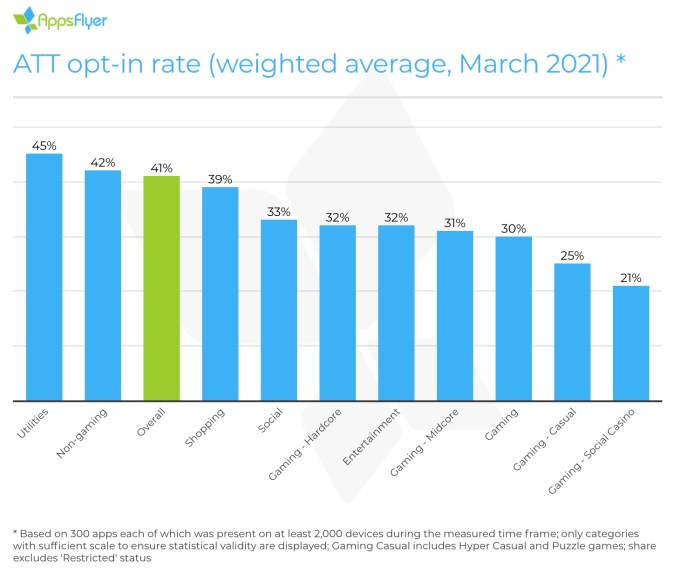
Image Credits: AppsFlyer
A new report on App Tracking Transparency (ATT) has yielded some interesting results. The new iOS 14 privacy feature will pop up a permissions request on users’ devices, asking them if they’d allow the app to track their activity. Most expected that users would almost universally say “No” to this request, which is why the mobile adtech industry is in chaos, with some companies even trying to figure out if they could work around the change that makes the existing ad identifier, the IDFA, obsolete.
But an AppsFlyer study found that opt-in rates for being tracked were much higher than anyone would have expected. The industry was forecasting opt-in rates anywhere from 2% to 20%, but were figuring things would more likely be in the single digits. So imagine everyone’s surprise when AppsFlyer found that opt-in rates were at a 28% average per app and a median of 32% (meaning about half the apps were exceeding 32%!).
The study was not a small sampling, either. The company counted 13,260,824 times when a prompt was shown to the end-user and found that 5,495,084 times (or 41%) the user tapped the “Allow” button. This took place in March 2021 across over 300 apps in multiple categories, including both apps and games.
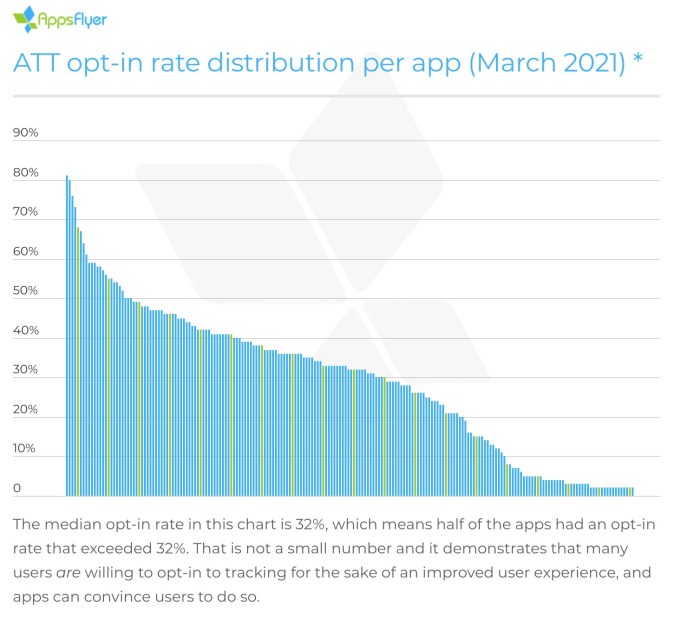
Image Credits: AppsFlyer
Of the 7,765,740 cases when tracking was denied, AppsFlyer said it was actually counting implicit “No’s” from users who previously enabled Limit Ad Tracking (LAT) on their devices in previous iOS versions. Since they had already said they wanted to limit ads, they don’t see the ATT prompt and are classified as denied.
The report found the opt-in rates were very different between apps and games, at 42% and 30%, respectively. This is due to lower brand affinity in gaming, it said. Larger apps also had higher opt-in rates. The top 10% (by device count) had a 50% higher rate than the bottom 10%.
Of course, we should caution that this initial data is preliminary and based off data collected from early adopters. This may not represent the industry at large. In other words, opt-in rates could certainly still change when Apple begins to officially enforce ATT with the release of iOS 14.5.
However, what could be working here is the use of something known as the pre-ATT prompt, which basically means gating Apple’s dialogue between the developer’s own prompt, that they can show at an appropriate time with their own messaging. By explaining to users that by opting in they may see more relevant content or help to keep the app free, users may be more likely to opt in, AppsFlyer suggested.
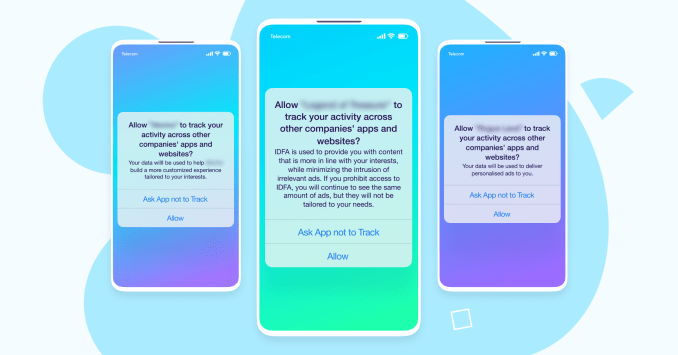
Image Credits: AppsFlyer
Apple
Apple device rumors! Analyst Ming-Chi Kuo says 2022 iPhones will feature a 48-megapixel camera, 8K video and come in only 6.1″ and 6.7″ sizes (no more 5.4″ Mini). Also predicted is an AR headset with 15 cameras.
Apple’s legal battle with Epic Games in Australian courts was temporarily put on pause while the U.S. case proceeds. Apple argued that the matter should be settled in the original jurisdiction in the U.S., while Epic says Apple’s anti-competitive behavior should be tried under Australian law as well. A judge ordered the case to be temporarily suspended for three months while the U.S. suit is underway.
Senate Judiciary Committee leaders Senators Amy Klobuchar (D-MN) and Mike Lee (R-UT) put pressure on Apple to provide a witness for an upcoming hearing on app store competition after it looked like Apple might bow out. But this week, the company committed to sending a representative to the Senate antitrust hearing, which Google will also attend. The hearing will focus on the tech giants’ control over “the cost, distribution, and availability of mobile applications on consumers, app developers, and competition.”
Apple filed an expert witness report for its U.S. legal battle with Epic Games where the witness stated that Apple would have to redesign its hardware and software in order to make the iPhone interoperable with alternative app stores outside of its own. Epic Games founder Tim Sweeney tweeted the statement was “baloney” and noted that Apple already has a program that allows users to install apps from the web, the Apple Enterprise Program. Only contractual obligations prevent such a mechanism from being used for consumer apps.
Due to U.S. trade restrictions, China manufacturer Huawei isn’t able to use Google Mobile Services (GMS) on their smartphone, so the company came up with an alternative, Huawei Mobile Services (HMS). Now it’s launched an open-source Choice SDK that will allow app developers to turn their GMS apps into HMS apps more easily. The SDK currently supports features like location, sign-in, analytics, maps and messaging.
Google Assistant, which is integrated with Android devices and available as a standalone app, this week rolled out new features. The AI voice assistant is now able to locate and ring misplaced and silenced iPhones instead of just Android devices. To do so, the device places a regular call to your mobile numbers. It can also complete restaurant takeout orders and design Routines.
Android leaks! Reportedly, Android 12 may bring enhanced privacy controls, according to XDA Developers and a set of leaked Android 12 screenshots they published. Specifically, Google is copying the iOS feature that alerts you when an app you’re using is accessing the clipboard. It’s also working on enhanced notification permissions that let you choose what type of alerts you want to receive, like “real-time” or “conversations.”
E-commerce
TikTok plans to launch a range of new e-commerce-focused ad products, including Collection Ads, which will enable brands to combine their product catalog listings and branded videos; and Dynamic Product Ads, which will automatically retarget users with relevant products according to their actions on publishers’ apps and websites.
Amazon-owned Zappos teamed up with streaming startup BuyWith to add livestream shopping, led by influencers.
Google’s Shopping app for Android and iOS is shutting down, as Google has expanded shopping features in Search and on YouTube in the two years since the Express app was rebranded as Shopping.
Augmented Reality
Gucci Beauty launched a new Snapchat lens that lets users virtually try-on its Rouge De Beauté Brilliant hybrid lipstick and other makeup, including foundation and eyeshadows.
Snap also launched an interactive Lens in the main Snapchat Lens Carousel for all Snapchatters in the U.S. that highlights five AR monuments from the Monumental Perspectives project. The company had brought artists and Snap Lens Creators together to create the five AR monuments to celebrate diverse histories across Los Angeles, in an effort to offer more inclusive perspectives from communities across the region.
Fintech
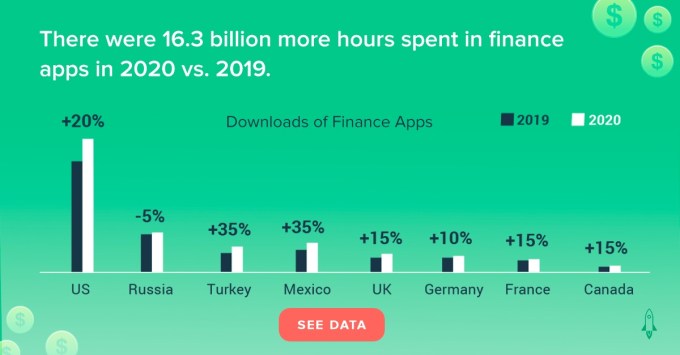
Image Credits: App Annie/Liftoff
A joint report by App Annie and marketing firm Liftoff found that downloads of finance apps grew 15% year-over-year in 2020 to 4.6 billion, and time spent in apps rose to 16.3 billion during the year, up 45% from 2019. In the popular category of investing apps, U.S. users spent 135% more time in the top five apps in this space, year-over-year.
A separate report by Sensor Tower found that finance app installs jumped 34% year-over-year in Q1 in the U.S. and Europe.
Social
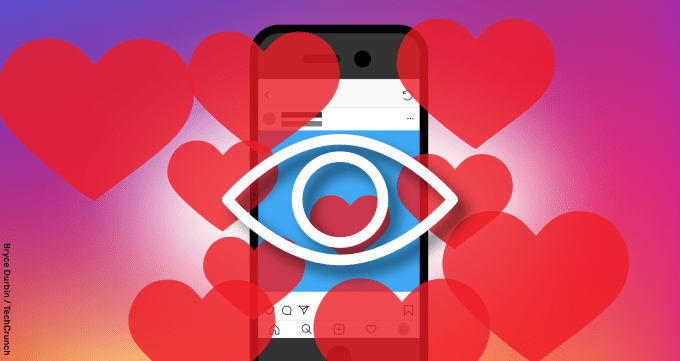
Image Credits: TechCrunch
Instagram is launching a new test that will allow you to choose if you want to hide “Likes,” and a Facebook test will follow. In the test, users will get to decide what works best for them — either choosing to see the Like counts on others’ posts, or not. Users will also be able to turn off Like counts on their own posts, if they choose. Facebook additionally confirmed it will begin to test a similar experience on its own social network. The test aims to balance the feedback from those who rely on Likes as a metric that enables them to prove their value to advertisers, and those who are impacted by the anxiety of chasing Likes.
Discord announced a policy change that says all adult content should be kept behind an NSFW warning and that all NSFW communities and channels will be blocked on iOS devices.
Reddit is said to be exploring a Clubhouse-like voice chat feature, Mashable reported. The development is said to be in the early stages. Reddit didn’t reply to requests for comments, the report said.
Facebook says it will test new business discovery features in the U.S. News Feed. When live, users tap on topics they’re interested in underneath posts and ads in their News Feed in order to explore related content from businesses.
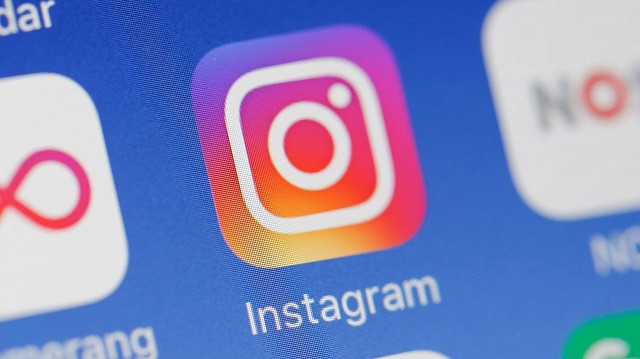
Image credit: Jaap Arriens/NurPhoto via Getty Images
Thirty-five consumer advocacy groups and 64 child development experts co-signed a letter to Facebook asking the company to reconsider its plans to launch an Instagram version for children under the age of 13, arguing that social media has several risk factors for children and adolescents, related to both physical health and overall well-being.
They also launched a petition anyone can sign. Despite the concerns being raised, Instagram’s plans to compete for younger users will not likely be impacted by the outcry. Already, Instagram’s top competitor in social media today — TikTok — has developed an experience for kids under 13. In fact, it was forced to age-gate its app as a result of its settlement with the U.S. Federal Trade Commission, which had investigated Musical.ly (the app that became TikTok) for violations of the U.S. children’s privacy law COPPA.
Facebook, too, could be in a similar situation where it has to age-gate Instagram in order to properly direct its existing underage users to a COPPA-compliant experience. At the very least, Facebook has grounds to argue that it shouldn’t have to boot the under-13 crowd off its app, since TikTok did not. And the FTC’s fines, even when historic, barely make a dent in tech giants’ revenues.
Streaming & Entertainment
Clubhouse rolls out payments to over 60K creators following its initial test launched earlier this month. To send a payment, users can visit a creator’s profile, then tap on the button at the bottom that says “Send Money.” Clubhouse says 100% of the payments go directly to creators.
The TV version of the Google Play Movies & TV app will shut down on Roku, LG, Samsung and Vizio TVs in June, while users’ purchases will be migrated to YouTube.
Health & Fitness
Apple filed for dismissal of an $800 million lawsuit brought on by a developer who claimed the App Store rejected a coronavirus app for “no good reason.” The App Store policy says it’s only accepting coronavirus apps from “recognized institutions such as government, hospital, insurance company, NGO, or a university.” The developer argues they had a medical doctor (a former NASA cardiologist) on their team.
TikTok funded its first episodic public health series, “VIRAL,” from NowThis. The series will feature interviews with public health experts and a live Q&A session focused on answering questions about the pandemic. The partnership represents TikTok’s first-ever funding of an episodic series from a publisher, though TikTok has previously funded creator content.
Google’s Digital Wellbeing app added a new feature called “Heads Up” in its Settings which will remind Pixel device owners to look up when they’re using their phone while out walking. The app requires permission to users’ physical activity and location.
Facebook began sharing state vaccine info in the News Feed to let people know when they’re eligible to get a COVID-19 vaccine in their state, when the general public is eligible in their state and links to their state health department and Facebook’s Vaccine Finder.
Dating apps
Match-owned dating app Hinge launched “video prompts” in its virtual dating feature. The prompts help daters gauge compatibility with debate topics, which can help break the ice and make the virtual dating experience feel less awkward.
Leading dating app Tinder hires former Yum Brands (Pizza Hut and KFC) CMO George Felix as its new chief marketing officer. Tinder CEO Jim Lanzone says Felix “delivers iconic brand positioning and outstanding results” but does so “in new ways with very different brands.”
Security
Gay dating site and app Manhunt, which has 6 million members, confirmed a data breach in February where a hacker gained access to the company’s accounts database. The hacker was able to acquire usernames, emails and passwords for a subset (11%) of its users.
Researchers discovered a WhatsApp security risk that allows a remote hacker to deactivate WhatsApp on your phone and stop you from getting back in, even if you had two-factor enabled.
Clubhouse CEO Paul Davison said the recent report of a data breach was false and that user data was not leaked, calling the article that reported it “clickbait.”
Security researchers found that the popular APKPure app, which helps users install older or discontinued Android apps from outside the Play Store, contained malicious adware. The most recent app version was siphoning data from users’ devices and pushed ads to the lockscreen and in the background to generate fraudulent revenue for adware operators.
Joker malware impacted over 500,000 Huawei users’ devices after they downloaded infected apps from the company’s official Android app store. Researchers found 10 seemingly harmless apps in AppGallery — like virtual keyboards, a camera, a launcher, a messenger, a sticker collection and more — that were infected with the malicious code.
Customer data from the ParkMobile mobile parking app was discovered being sold online. The data included customer email addresses, dates of birth, phone numbers, license plate numbers, hashed passwords and mailing addresses for 21 million customers. ParkMobile attributed the breach to “a cybersecurity incident linked to a vulnerability in a third-party software that we use.”
Privacy
In legal settlements, Disney, Viacom and 10 adtech firms, including Twitter’s MoPub, agreed to remove certain advertising software from children’s apps due to privacy violations. The companies had placed tracking software in kids’ apps without parents’ knowledge or consent, the class-action cases had stated. SDK defendants also include AdColony, Chartboost, Flurry, InMob, ironSource, Tapjoy, Vungle, Unity Technologies, Comscore (Full Circle Studies), and Upsight.
💰 Messaging app Wire raised $21 million Series B led by UVC Partners for its end-to-end encrypted messaging app and service. The company redirected its focus from consumers to the enterprise market a couple of years ago and now has 1,800 customers, up 50% year-over-year.
💰 Ordering app and website Slice raised a $40 million Series D to power the marketing and ordering for independent pizzerias. The round, partially aimed at getting Twitter’s former CEO Dick Costolo and former COO Adam Bain on board, was led by Cross Creek and follows last year’s $43 million Series C.
🤝 Triller acquired AI-based customer engagement platform, Amplify.AI, whose co-founder Mahi de Silva will now become TrillerNet’s CEO. Existing CEO Mike Lu will transition to president of TrillerNet and will focus on investor relations. The company separately announced the acquisition of FITE TV, a live event and pay-per-view combat sports streaming platform which will now become home to Triller Fight Club.
💰 Streaming media company Plex, which has apps for web, TV and mobile, raised a $50 million growth round to fuel its ad-supported streaming business and launch new services, including a TV and movie rentals (and maybe purchases) marketplace, and a subscription channels store.
💰 Epic Games, the company behind Fortnite, Houseparty and Unreal Engine, raised a massive $1 billion round, valuing the business at $28.7 billion. The round included a $200 million Sony Group Corporation investment. Other investors included Appaloosa, Baillie Gifford, Fidelity Management & Research Company LLC, GIC, T. Rowe Price Associates-managed accounts, Ontario Teachers’ Pension Plan Board, BlackRock managed accounts, Park West, KKR, AllianceBernstein, Altimeter, Franklin Templeton and Luxor Capital.
💰 French on-demand pediatrics app Biloba added support for prescriptions and raised a $1.7 million seed round for its app that lets parents reach a general practitioner and a nurse when they have medical questions about their child.
💰 U.K. climate-focused investing app Clim8 raised $8 million from 7pc Ventures. The app allows consumers to invest in companies and supply chains that focus on tackling climate change, and competes with startups including Tickr, Helios and Yova.
Avatarify
Avatarify
Avatarify, reviewed here by TechCrunch, is a new startup for making deepfake videos on your phone. The app processes user’s photos, then turns them into short videos by animating faces, using machine learning algorithms and adding sounds. The user can also select the effects and music they want to use, then tap to animate the photo. This resulting short video can then be shared to Instagram, Facebook or TikTok. The app has a freemium subscription model that costs $34.99/year or $2.49/week.
Feels
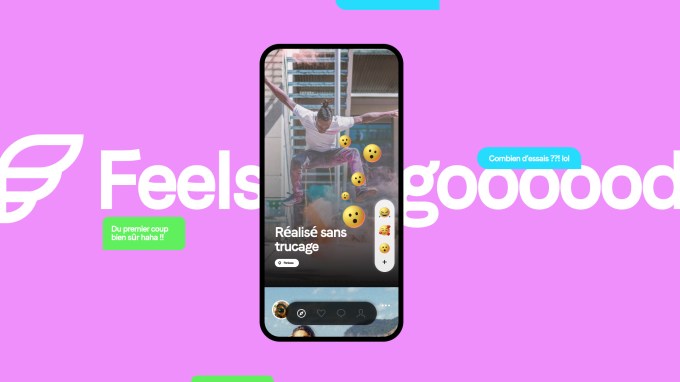
Image Credits: Feels
French startup Feels has launched a new dating app that wants to rethink the typical dating app profile, which today is more like browsing a catalog of people. In Feels, users can record videos, add text and stickers, answer questions, share photos and more. It also changes how users interact with profiles, ditching the binary thumbs up/down or swipe left/right for a feed of videos where you can react to users’ content or just swipe up to move on. There’s also no “Like” button here.
FCC Speed Test App
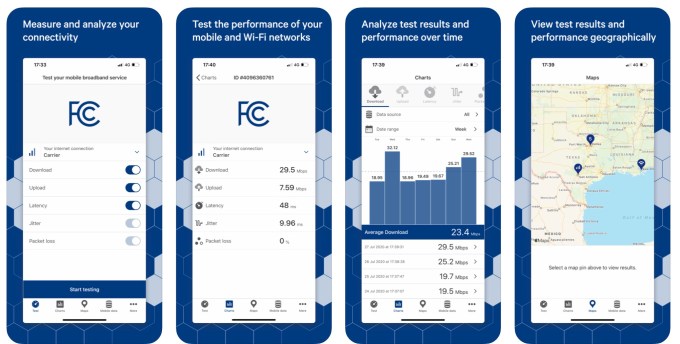
Image Credits: FCC
The U.S. Federal Communications Commission launched its own speed test app for both iOS and Android that aims to measure internet speeds across the country in order to better determine what areas need better access to broadband. The FCC’s current data on broadband speeds come from ISPs like Verizon and AT&T who will exaggerate their coverage, drawing criticism.
[ad_2]
Source link



